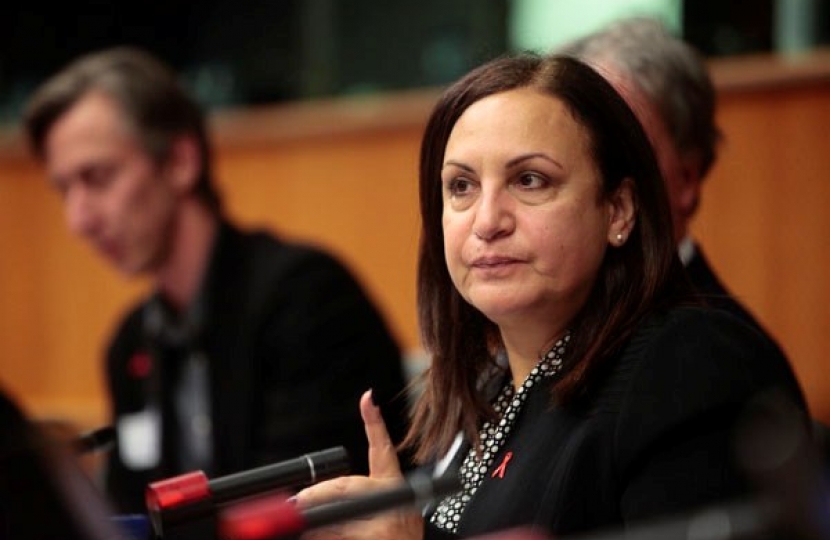
Cathy Ashton doesn’t know how much of €3 million entertaining budget is spent on Europe Day
Brussels, 18 June 2012 – Last month, EU diplomats the world over were passing round the Ferrero Rocher and raising glasses of champagne to the European project as the EU marked its “national day” of 9 May. Yet, at a time of austerity, EU Foreign Affairs High Representative Catherine Ashton does not know how much her diplomats are spending on receptions to celebrate “Europe Day”.
In an answer to a parliamentary question submitted by London Conservative MEP Marina Yannakoudakis, Ashton replied that it was “not possible to provide details of expenditure specifically for Europe Day celebrations”.
Ashton’s office did release figures on the “representation allowance” for EU diplomats posted abroad. The wining-and-dining budget for 2012 was just over €3 million (£2.48 million). Guidelines recommend that no more than 30% of the annual budget should be used to celebrate Europe Day.
The answer from the European External Action Service claimed that it was “conscious of the severe economic climate” and had “been making efforts to reduce expenditure”.
Marina Yannakoudakis said; “This year’s Europe Day took place in a week when the Greeks and the French voted against austerity measures imposed by Brussels.
“As the French and the Greeks reject austerity again, the European External Action Service should remain mindful of the sacrifices which are being made across the EU.
“It is unacceptable that the European External Action Service should be spending up to €1 million on celebrating Europe Day. It is even worse that Cathy Ashton cannot provide accurate figures of how the money is being spent. This is a disgrace. No wonder auditors cannot sign off on the EU’s accounts.”
Earlier this year Marina submitted a question which revealed that the EU External Action Service was spending €11.9 million (£9.6 million) a year on information and communication.
Marina has also submitted a parliamentary question on the European Commission’s spending on Europe Day, but has yet to receive a response in spite of the deadline for a reply having elapsed.
ENDS
For more information please contact Matthew Green: [email protected] or +44 7900 090770
http://www.marinayannakoudakis.com
http://facebook.com/MarinaMEP
http://twitter.com/MarinaMEP
Note for editors:
Question:
In the week in which Europe Day is marked, the people of France, Greece and Schleswig‑Holstein have expressed their dissatisfaction with EU austerity plans at the ballot box.
Can the EEAS please provide a detailed breakdown as to how much it spent on events marking Europe Day in third countries in May 2012?
Please include details of diplomatic receptions, seminars, concerts and any other events related to 9 May. As Brussels is so keen on austerity, can it provide last year’s figures by way of comparison, to show that the EEAS too is tightening its belt?
Answer:
The representation budget of the EEAS for 2012 amounts to EUR 2,234 million. This is supplemented by a contribution of the European Commission to the administrative costs of their staff in European Union Delegations of EUR 0,838 million, making a total budget of EUR 3,072 million.
This amount is used, in addition to activities linked to Europe Day, to finance the usual representation activities of a network of 140 delegations worldwide and represents an average budget of EUR 21.942 per delegation. The activities financed include the hosting of meetings previously assumed by the rotating Presidency in third countries and now transferred to the EEAS following the Lisbon Treaty. The comparative figures for 2011 and 2013 can be found in the table below.
EEAS (EUR)
COMM (EUR)
TOTAL (EUR)
2011
2.351.623
965.000
3.316.623
2012
2.234.000
838.000
3.072.000
2013
2.176.000
813.000
2.989.000
As can be seen from this table the EEAS, conscious of the severe economic climate, has been making efforts to reduce expenditure in this area despite increasing responsibilities under the Lisbon Treaty and has cut its budget by almost 10% between 2011 and 2013.
It is not possible to provide details of expenditure specifically for Europe Day celebrations but general guidelines recommend that no more than 30% of the annual budget per delegation be used for this purpose. It is underlined that events hosted by European Union delegations in third countries provide high visibility to the work of the Union in the host country and are seen as important events not just by the host country but also by the diplomatic community in general, including the Member States.



